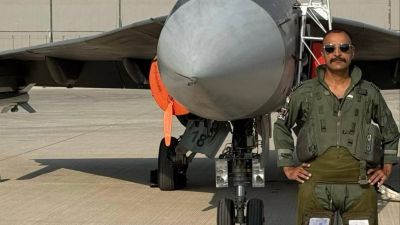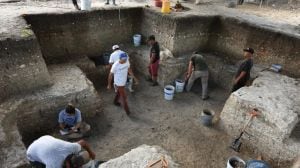All I could hear was bang,bang,bang…
When Abbas al Lawati boarded the Mavi Marmara in the international waters of the Mediterranean Sea on May 27,he didnt have the faintest notion...
When Abbas al Lawati boarded the Mavi Marmara in the international waters of the Mediterranean Sea on May 27,he didnt have the faintest notion that the events about to unfold over the next week would see him hit the headlines back home in Oman.
Abbas,a Gulf News reporter,was a member of the international media delegation that was on board the Turkish vessel on way to Gaza with humanitarian aid as a part of the Freedom Flotilla. The convoy left for Gaza on May 31 and was raided by Israeli commandos early on June 1,leaving at least nine Turkish activists dead.
In an exclusive interview after his return to Muscat two days ago,Abbas recalled those traumatic hours,revealing that the flotilla organisers appeared to be prepared to face any Israeli attempt to take over the ship. They told us that the Israeli warships were planing to attack before daybreak. We were told that as a strategic move,the flotilla had decided to sail horizontally along the Turkish Straits to delay entry into Gaza and avoid any attack in the dark, he said. All of us (activists and journalists) were given life jackets. There was a group of guards with gas masks on board to defend any Israeli takeover attempt. But none of them was carrying any weapons (as claimed by the Israeli authorities), he added.
Fateful night
Describing the events that unfolded that night,Abbas said,The media delegation was attending a press conference on the ship at around 11 p.m. (Mediterranean Time) when someone rushed into the room and asked us to come on to the deck. We knew then that something was wrong.
The flotilla was surrounded by several Israeli warships. I rushed to the deck with my camera. We spotted the Israeli warships in the dark. They asked the ship to identify itself but issued no warning. After an answer from our captain,the Israeli ships left.
The media team returned to the press room. We started reporting on this development. I updated my blog and Twitter account; the organisers had arranged for hi-tech communication equipment on board.
Abbas said nothing happened for the next couple of hours. I woke up to the sound of gunshots and the morning azaan. The Israeli troops raided the vessel around 4.30 a.m.
Abbas picked up his camera from the press room and rushed back on deck. When I went up,I felt I was in a war zone. It was surreal. Israeli choppers hovered above the ship. Small Israeli speedboats were metres away,flashing spotlights at everyone in view. All I could hear was bang,bang,bang… I thought they were teargas shells and I didnt have a gas mask. When smoke started appearing,an activist handed me a handful of cut onions to smell,saying it would help in resisting the gas. The group of guards tried to prevent Israeli commandos from boarding the ship with the use of hosepipes. Other makeshift weaponslike iron rods from the railing on the ship and chairswere also used to defend the ship, he said,adding,The guards with gas masks picked up the smoke bombs and teargas shells from the deck and threw them back at the Israeli speedboats,which led the commandos to use lethal weapons. I realised it wasnt safe for me to stand there,so I went inside towards the press room.
Shock and horror
But when Abbas saw an Israeli commando inside and some activists with blood on their faces,it hit him for the first time that people were being killed. Someone told me that a few people were dead. I could see the fear in the eyes of the activists. I could only think,This was not what was supposed to happen. I later saw some of the corpses with shock and horror. I had prepared myself psychologically for the most extreme circumstances in advance,but not death. I had the uneasy sense of not knowing what to expect.
The Israeli commandos took over the press room and confiscated everything there. In the ensuing chaos,Abbas lost his backpack which had his passport,two of his three phones,laptop,a camera,watch,car and house keys,press accreditation and about $2,000. Once the Israelis took over the press room,I had a feeling I was never going to get any of that back, he said.
A few minutes after the first bullet was fired,Mavi Marmara surrendered. The Israeli siege was over and communication systems were disabled. However,the activists had control over the PA (public announcement) system through which they tried to inform the Israeli soldiers about the dead and the injured.
Abbas said the commandos kept ignoring these pleas of help. Knessets (Israeli parliament) Israeli-Arab member Haneen Zoubi (who was also on board Mavi Marmara in support of the activists) waved a white handkerchief. She also wrote a message in Hebrew,seeking help for the injured,on a large piece of cardboard and waved it at the commandos. But they ignored their own lawmaker and didnt respond. Then the soldiers handcuffed all the activists,one by one. We were treated like wanted terrorists. Aided by her parliamentary immunity,Haneen was the only person who could successfully defy the Israeli soldiers during our long journey towards the Israeli coast.
Behind bars
After a long wait,the ship docked at Israels Ashdod port on the night of June 1. We were completely disoriented and had lost our sense of time and location. It must have been around midnight when the activists were asked to disembark, Abbas said.
The handcuffed activists were asked to sign a piece of paper which said they accept that they had committed an international crime. The official told me,You sign and youll be free. I disagreed. They threatened me by saying that since Oman doesnt have an embassy in Israel,they didnt know for how long Id have to be behind bars. But I still refused to sign.
Abbas,along with several activists,was then transported in a caged vehicle to a prison in the Israeli city of Beersheba. There,I had to sleep on the floor without a bedsheet and pillow. I was shivering when I woke up the next morning but kept telling myself that I couldnt get sick. It had been over 24 hours since I had eaten anything and I felt weak. I got to eat sometime around noon. A doctor visited me,hours after I requested for a medical check-up.
End of an ordeal
Abbas was worried about his fate as Oman did not have diplomatic ties with Israel. I was wondering whether anyone in Oman was even aware of my condition. I was just praying and hoping that somebody had contacted the Jordanian authorities,who have an embassy in Israel. I stayed closer to the Jordanian detainees.
His prayers were soon answered. When a diplomat from Jordan visited,Abbas introduced himself and asked whether anyone from Oman had got in touch. To my great relief,he said,Yes,we have your name on the list. I felt so grateful that somebody in Oman was after all looking for me.
Abbas left the Beersheba prison that night along with nearly 120 activists. They were deported to Jordan on police vehicles. These caged cars were so cold inside. Till the last moment,they (the Israelis) made us feel as unwelcome as they could, he said.
His ordeal was over once they crossed the Jordanian border on June 3. The Omani embassy in Amman issued him a temporary passport and arranged for his return home.
Courtesy: Muscat Daily





- 01
- 02
- 03
- 04
- 05


























